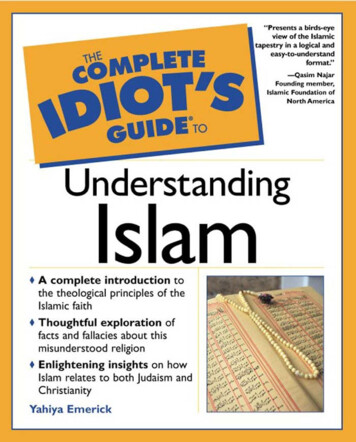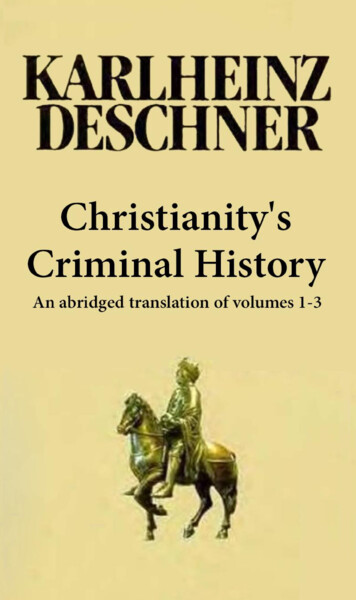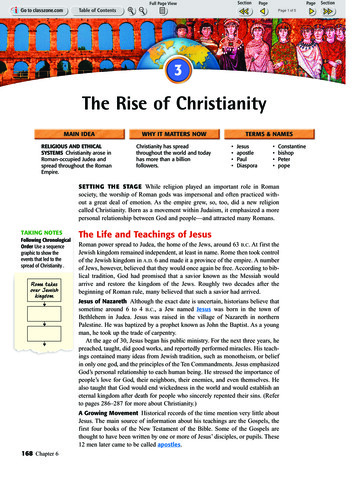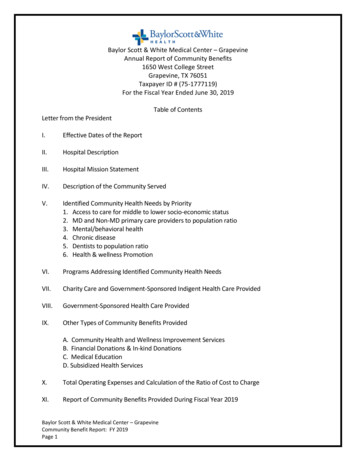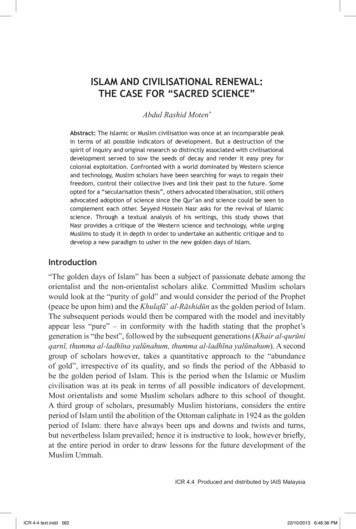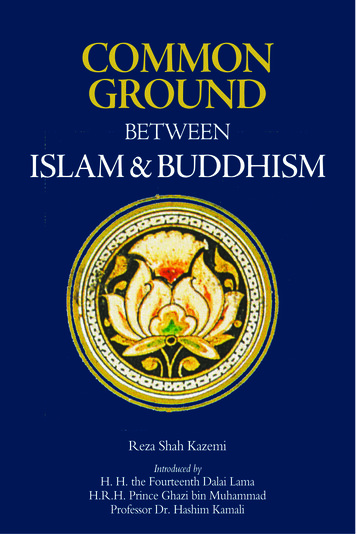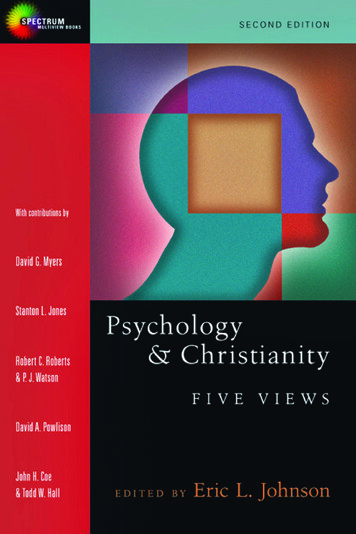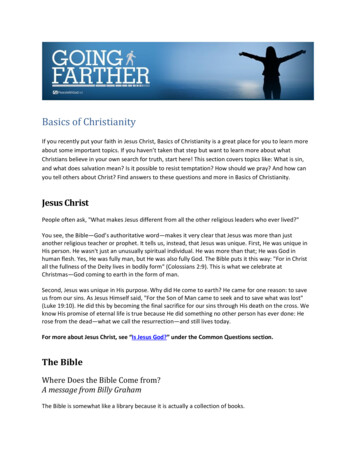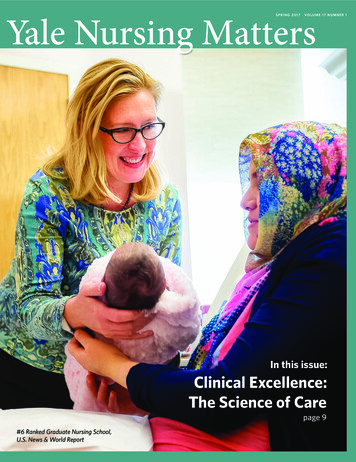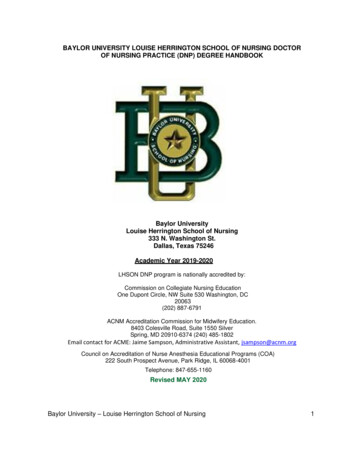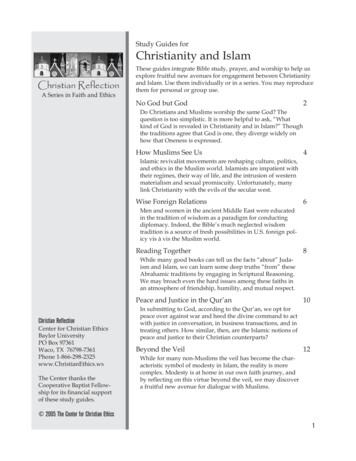
Transcription
Study Guides forChristianity and IslamChristian ReflectionA Series in Faith and EthicsThese guides integrate Bible study, prayer, and worship to help usexplore fruitful new avenues for engagement between Christianityand Islam. Use them individually or in a series. You may reproducethem for personal or group use.No God but God2Do Christians and Muslims worship the same God? Thequestion is too simplistic. It is more helpful to ask, “Whatkind of God is revealed in Christianity and in Islam?” Thoughthe traditions agree that God is one, they diverge widely onhow that Oneness is expressed.How Muslims See Us4Islamic revivalist movements are reshaping culture, politics,and ethics in the Muslim world. Islamists are impatient withtheir regimes, their way of life, and the intrusion of westernmaterialism and sexual promiscuity. Unfortunately, manylink Christianity with the evils of the secular west.Wise Foreign Relations6Men and women in the ancient Middle East were educatedin the tradition of wisdom as a paradigm for conductingdiplomacy. Indeed, the Bible’s much neglected wisdomtradition is a source of fresh possibilities in U.S. foreign policy vis à vis the Muslim world.Reading Together8While many good books can tell us the facts “about” Judaism and Islam, we can learn some deep truths “from” theseAbrahamic traditions by engaging in Scriptural Reasoning.We may broach even the hard issues among these faiths inan atmosphere of friendship, humility, and mutual respect.Peace and Justice in the Qur’anChristian ReflectionCenter for Christian EthicsBaylor UniversityPO Box 97361Waco, TX 76798-7361Phone 1-866-298-2325www.ChristianEthics.wsThe Center thanks theCooperative Baptist Fellowship for its financial supportof these study guides.10In submitting to God, according to the Qur’an, we opt forpeace over against war and heed the divine command to actwith justice in conversation, in business transactions, and intreating others. How similar, then, are the Islamic notions ofpeace and justice to their Christian counterparts?Beyond the Veil12While for many non-Muslims the veil has become the characteristic symbol of modesty in Islam, the reality is morecomplex. Modesty is at home in our own faith journey, andby reflecting on this virtue beyond the veil, we may discovera fruitful new avenue for dialogue with Muslims. 2005 The Center for Christian Ethics1
No God but GodChristian ReflectionA Series in Faith and EthicsFocus Article:No God but God(Christianity and Islam,pp. 11-17)Suggested Article:God Is Greater(Christianity and Islam,pp. 62-64)What do you think?Was this study guide usefulfor your personal or groupstudy? Please send yoursuggestions to:Christian Reflection@baylor.eduChristian ReflectionCenter for Christian EthicsBaylor UniversityOne Bear Place #97361Waco, TX 76798-7361Phone 1-866-298-2325www.ChristianEthics.ws 2005 The Center for Christian EthicsDo Christians and Muslims worship the same God? The questionis too simplistic. It is more helpful to ask, “What kind of God is revealed in Christianity and in Islam?” Though the traditions agreethat God is one, they diverge widely on how that Oneness is expressed.Prayer1O God, you are God, besides whom there is no God: the Knower ofthe unseen and the seen; you are the Beneficent, the Merciful.You are the King, the Holy, the Giver of peace, the Granter ofsecurity, Guardian over all, the Mighty, the Supreme, thePossessor of every greatness. Yours is the glory.You are God, the Creator, the Maker, the Fashioner. Yours are themost excellent names; whatever is in the heavens and the earthdeclares your glory. You are the Almighty, the All-wise.As heaven and earth declare your glory, come to us, O God, andteach us to glorify your name. Amen.Scripture Readings: Exodus 18:1-27; John 4:19-24ReflectionThough Christians and Muslims often “talk past each other” aboutthe nature of God and how God is revealed in the world, these topics are “fruitful starting points” for dialogue between the traditions.When we attend to the Bible and to the primary sources in orthodoxIslam—the Qur’an and the Hadith (the collected stories about the lifeand teachings of Muhammad)—we find a “surprising wealth ofcommonalities” on God’s nature.“Both traditions care deeply about worshiping God as Creator,Supreme Lord, and Final Judge of the creation, and they agree thatGod gives moral revelation and spiritual guidance through prophets and the community of faith,” van Gorder observes. “Commonthemes in their worship include receiving forgiveness from God,extending forgiveness to one another, and submitting all of our lifeto the One God.”Christians and Muslims disagree on God’s relational nature.“Through Jesus we have come to know God as an active participantamong humanity through divine love,” he says. “In Islam, the primary affirmation is that ‘God is One’ and thus beyond the limitations of finite comprehension. Christianity calls individuals to enterinto covenant relationship with God. Islam calls individuals to worshipfully assume a proper place of obedience before God’s will andrevelation.” Nevertheless, he says the Gospel appeals to Muslims, for“the relationship that Christians have towards God is based on therevelation that God is ‘our Father.’ Expressed this way, the Christiandoctrine of the Incarnation may be viewed by Muslims not as a blasphemous absurdity but as the summation of God’s Fatherhood.” Inour conversations with Muslim friends about God’s nature, vanGorder urges us: to understand the central ideas of Islam. This requires listening andlearning from Muslims, which may be more difficult than ever.“While unflattering images—brash terrorists, suicidal fanatics,and a host of others—dominate American media-generated2
Christian ReflectionA Series in Faith and Ethicspasquinades of Islam, too few of us bother to nurture a deep andstudied appreciation for Islamic art, music, literature, architecture, and ethics,” he notes. “There is no justification for thiscontinued ignorance and defamation.” to speak clearly with love. “If your brother does not understandyou,” an African proverb laments, “perhaps it is because you donot fully love him.” The loving work of careful exposition requires us to be humble and patient, and to be inventive in craftingnew theological language in response to how Muslims comprehend the Gospel. “Without apology, we should present our faithas filled with mystery—referring to the atonement CharlesWesley wrote, ‘The Immortal dies! Who can explore this strangedesign?’ Yet, we should make the effort to articulate logicallywhat these mysteries mean to us.” to listen with humility. We can present our claims of truth with thehumility “of the Apostle Peter, who not only readily presented amessage to Cornelius, but also received truth from him in a spiritof teachableness (Acts 10:28-48),” writes van Gorder. “Focusingtoo much on diplomacy, in fact, can inhibit the potential forgenuine insight, for we may be confident that, as we interact withMuslims, God will bring us to greater insight just as He usedCornelius to direct Peter into deeper dimensions of biblical truth.By this posture of being willing to learn, we express our confidence in faith and we may engender a similar response ofteachableness in others.”Karen Thomas Smith finds guidance for our conversations withMuslim neighbors in two biblical events—Jethro’s visit to his son-inlaw Moses, and Jesus’ encounter with the Samaritan woman. “Wemust bear the tension of living in the ambiguous domain of spiritand truth, where even those of alien faith may speak to us of the Godwho has poured himself out in saving love in Jesus Christ,” sheconcludes. “Even where God has done this unique thing in Christ,we can expect others who do not share our faith to visit us and blessus even as we witness to them of the saving acts of God. And wemay all wonder at the mystery of the God who is greater than ourimagining.”Study QuestionsRobert B. Kruschwitz, the author ofthis study guide, directs TheCenter for Christian Ethics atBaylor University. He servesas General Editor of ChristianReflection.1. What questions do you have about the Muslim view of God?Where do you turn for reliable information?2. Discuss van Gorder’s claim that “the central theological messagefor Christians interacting with Muslims is not that ‘our God’ istrue and ‘your God’ is not, but the biblical revelation that ‘God islove’ and is actively seeking humanity to participate in a newcovenant with God (Jeremiah 31:31-34).”3. For Smith, how does Jethro’s visit to Moses suggest that AllahuAkbar, or God is greater”? How is this theme present in Jesus’conversation with the Samaritan woman?4. How can your congregation prepare members for dialogue withMuslim friends and neighbors?Departing Hymn: “Hear the Prophet Speak of Water” 2005 The Center for Christian Ethics†With phrases from Surah 59:1, 22-24 in Shakir translation of The HolyQur’an.3
How Muslims See UsChristian ReflectionA Series in Faith and EthicsFocus Article:How Muslims See Us(Christianity and Islam,pp. 18-27)Suggested Article:Questions Rooted in Faithand History(Christianity and Islam,pp. 84-88)What do you think?Was this study guide usefulfor your personal or groupstudy? Please send yoursuggestions to:Christian Reflection@baylor.eduChristian ReflectionCenter for Christian EthicsBaylor UniversityOne Bear Place #97361Waco, TX 76798-7361Phone 1-866-298-2325www.ChristianEthics.ws 2005 The Center for Christian EthicsIslamic revivalist movements are reshaping culture, politics, andethics in the Muslim world. Islamists are impatient with their regimes, their way of life, and the intrusion of western materialism andsexual promiscuity. Unfortunately, many link Christianity with theevils of the secular west.PrayerWe pray for those we know who have suffered evils of all kinds,who suffer still from their wounds, and who long for securityand salvation.Teach us again, as Jesus taught us, to pray for enemies andbless those who curse us, so that prayer may be turned intopeace and cursing transformed into blessing for all of us,your people, and for our posterity.God, you are the Alpha and the Omega, the First, Al-Awwal, andthe Last, Al-Akhir.May we find our ending as our beginning in your peace, Godof peace, As-Salam, and may we dwell in your house ofpeace forever and ever. Amen.Scripture Reading: Genesis 17:1-7ReflectionA beautiful illumination in the twelfth-century Bible de Souvigny depicts Abraham holding the righteous in his bosom. Among the twenty smaller figures that face one another in conversation, one holds aBible, and all of them are gathered together by the arms of the largerfigure, Abraham, who gazes out toward us, the readers of scripture.Due in part to the Muslim influence on the artist’s work, it sometimes is titled “Jews and Arabs in the arms of Abraham.” One sourceidentifies the small figures as “Jews, Muslims, and Christians,” for invarying ways all three trace their spiritual descent from God’scovenant with Abraham.Genesis carefully places the story of Ishmael’s birth to Abrahamand Hagar, Sarah’s Egyptian slave, between the first account of thecovenant (15:1-21) and its restatement with the sign of circumcision(17:1-7). God’s protection of Hagar and Ishmael will be mirrored inAbraham’s love for his first son, who is circumcised with him as asign of the covenant (17:23-27). Though God extends the covenantthrough the promised son Isaac, God blesses Ishmael with twelveprincely sons who will lead a great nation (17:20-21). Muhammadconsidered himself to be a descendent of Ishmael, as do the people ofArabia today.Our common heritage in Scripture is more difficult than ever forJews, Christians, and Muslims to acknowledge and explore. A sourceof friction is the rhetoric of “Islamic revivalism,” for though thismovement primarily targets the politics and culture of the West, itis often antagonistic toward Jews and Christians generally. Somereasons for this, Wagner says, may be found in: the recent political history of the Middle East. Since the end of theOttoman Empire in 1919, Arab nations have suffered politicaldefeat by various European nations, the U. S., and Israel, and lossof control of the “Noble Sanctuary” in Jerusalem. Political and4
Christian ReflectionA Series in Faith and Ethicseconomic systems—experiments with secular Pan-Arab Nationalism, Marxism, and Arab monarchies—have failed to keep pacewith the developed world’s advancing quality of life. “MiddleEasterners who once were fascinated with things American andmaintained a keen desire to visit the United States are now becoming angry with U.S. policies,” Wagner notes. “The UnitedStates has replaced England and France as the hated colonialpower, the occupying power that needs to be repelled from theregion.” the personal experience of prominent leaders of the revival, like SayyidQutb (1906-1966). Living in the United States during the 1950s,Qutb was deeply troubled by “churches using secular entertainment schemes to draw larger numbers; rampant sexual immorality; racism toward African-Americans; and Israel receivingunconditional support by the U.S. government and in mainstream media.” He returned to Egypt and portrayed the powerful United States as morally bankrupt. our confusion of Gospel with empire. Earlier missionaries often hadclose ties with western governments. Despite “the wonderfulaccomplishments of Catholic and Protestant missionaries inspreading the Gospel and establishing educational institutionsand medical facilities, all too often as missionaries exportedwestern political interests and culture into the Islamic world, theessence of the Gospel was compromised.”Can we approach Muslims with “a humble attitude, a listeningheart, and a contrite spirit,” as Wagner recommends? “At times thejourney will be difficult and controversial. We will discover richgrowth in our own Christian faith as well as make new friends onthe path of dialogue that seeks understanding.”Study Questions1. Can the Gospel be separated from western culture? When weshare the Gospel, what do many Muslims hear?2. Describe the “10/40 window” approach to Christian missions.What caution does Wagner raise for the evangelical missionaryagencies that adopt this approach?3. Wagner sketches the inclusivist, exclusivist, and pluralist paradigms to approach people of other world religions. Why does herecommend the exclusivist paradigm? Do you agree?4. How does the hymn “To You, Our God, We Fly” balance ourrepentance with a call for God’s protection?Departing Hymn: “To You, Our God, We Fly” (verses 1, 2, 3, and 8)Robert B. Kruschwitz, the author ofthis study guide, directs TheCenter for Christian Ethics atBaylor University. He servesas General Editor of ChristianReflection. 2005 The Center for Christian EthicsTo you, our God, we fly / for mercy and for grace;O hear our lowly cry, / and hide not, Lord, your face.Arise, O Lord of hosts! / Be jealous of your name,and drive from out our coasts / the sins that put to shame.Your best gifts from on high / in rich abundance pour,that we may magnify / and praise you more and more.Give peace, Lord, in our time; / O let no foe draw nigh,nor lawless deed of crime / insult your majesty.William W. How (1871), alteredSuggested Tune: IBSTONE5
Wise Foreign RelationsChristian ReflectionA Series in Faith and EthicsFocus Article:Wise Foreign Relations(Christianity and Islam,pp. 28-35)Suggested Article:Reading Lockeon the Tigris(Christianity and Islam,pp. 65-67)Men and women in the ancient Middle East were educated inthe tradition of wisdom as a paradigm for conducting diplomacy. The Bible’s much neglected wisdom tradition is a sourceof fresh possibilities in foreign policy vis à vis the Muslimworld.PrayerScripture Reading: I Kings 3:3-15Responsive Reading (Psalm 72:1-5; 12-14)Of Solomon [we sing]:Give the king your justice, O God,and your righteousness to a king’s son.May he judge your people with righteousness,and your poor with justice.May the mountains yield prosperity for the people,and the hills, in righteousness.May he defend the cause of the poor of the people,give deliverance to the needy,and crush the oppressor.May he live while the sun endures,and as long as the moon, throughout all generations.For he delivers the needy when they call,the poor and those who have no helper.He has pity on the weak and the needy,and saves the lives of the needy.From oppression and violence he redeems their life;and precious is their blood in his sight.ReflectionWhat do you think?Was this study guide usefulfor your personal or groupstudy? Please send yoursuggestions to:Christian Reflection@baylor.eduChristian ReflectionCenter for Christian EthicsBaylor UniversityOne Bear Place #97361Waco, TX 76798-7361Phone 1-866-298-2325www.ChristianEthics.ws 2005 The Center for Christian EthicsKing Solomon began a ruthless opportunist, establishing his ruleover Israel by murder (of his half-brother Adonijah and father’scommander Joab) and exile (of the priest Abiathar), and keeping itwith strategic foreign marriages and religious syncretism (1 Kings2:12-3:2). With wonderfully ironic timing, the God of Israel invadesthe merciless, self-serving monarch’s dream during his politicallyconvenient jaunt to sacrifice at the “high place” of Gibeon. Solomon’sturnaround leads him to worship before the ark of the covenant,repent through a fellowship offering, and throw a feast for all hisservants (3:15). At the heart of his gift of wisdom is a newfoundconcern for the nation’s wellbeing.“We need to think outside the box,” says Strohmer, to realize thebiblical “wisdom tradition comprises a wealth of literature that invites us into the stories, intrigue, and policies surrounding thestatesmen, diplomats, and foreign ministers of the ancient MiddleEast.” This tradition approaches law, commerce, and statecraftthrough the “conditions that are universal to the entire humanfamily, which places the literature at the service of humanity as awhole, before any distinctions are made between believers and thosewho would not consider themselves believers.”As Israel developed as a nation under David and Solomon, likeother ancient nations it formed a professional class of “the wise,”including hakâmîm, “high-ranking government officials who6
Christian ReflectionA Series in Faith and Ethicsspecialized in matters of state and international relations,” andsôperîm, “political secretaries and professional writers called scribes.”These men and women were “tasked with developing geopoliticalcommon ground on which to frame policies that are as just and goodfor all sides as possible.”Finding common ground is a crucial goal in the Middle East today, for as negotiator Rabbi Marc Gopin observes, “the ubiquitoushuman psychology of othering, the need to distinguish and exclude”remains the greatest obstacle facing diplomats there. Strohmer hopesthat “moderate and progressive Islamic reformers would be receptive to the wisdom way, for it corresponds in part with the Islamictradition of ijtihad, which is popularly translated ‘independentthinking’ or ‘critical reasoning.’”Study Questions1. How does “the wisdom tradition within foreign policy [have] afamily resemblance much closer to philosophy than to theology”?Why does Strohmer think Christian Zionism is out of step withthe biblical wisdom tradition?2. If we were to follow the wisdom way in the Middle East today,Strohmer suggests, we might embrace “Ezekiel’s vision of a newholy land,” which applies “a principle that resident aliens andnative Israelites should be treated alike” (Ezekiel 47:22-23). Howwould this principle apply today?3. Some might object that using the Bible as a source of ideas inforeign policy is inappropriate. Discuss Strohmer’s response.4. What experiences in Dohuk, Iraq, helped Mark Long breakthrough his stereotypes of Muslim believers? Are similar experiences available to you?5. In the context of “wise relations,” discuss Mark Long’s realization: “How often I have felt ‘right’ about my faith only by convincing others they were ‘wrong’ in theirs. How often I have doneapologetics but forgotten to give grace, to declare through my lifeas well as my words the gospel of our Lord.”Departing Hymn: “Let There Be Light, Lord God of Hosts”Robert B. Kruschwitz, the author ofthis study guide, directs TheCenter for Christian Ethics atBaylor University. He servesas General Editor of ChristianReflection. 2005 The Center for Christian EthicsLet there be light, Lord God of hosts,let there be wisdom on the earth;let broad humanity have birth,let there be deeds, instead of boasts.Within our passioned hearts instillthe calm that ends all strain and strife;make us your ministers of life;purge us from lusts that curse and kill.Give us the peace of vision clearto see our brothers’ good our own,to joy and suffer not alone,the love that casts away all fear.Let woe and waste of warfare cease,that useful labor yet may buildits homes with love and laughter filled;God give your wayward children peace.William M. Vories (1880-1964), alteredSuggested Tunes: HESPERUS or WINCHESTER NEW7
Reading TogetherChristian ReflectionA Series in Faith and EthicsFocus Article:Reading Together(Christianity and Islam,pp. 68-75)Suggested Article:First Steps in Understanding(Christianity and Islam,pp. 89-93)What do you think?Was this study guide usefulfor your personal or groupstudy? Please send yoursuggestions to:Christian Reflection@baylor.eduChristian ReflectionCenter for Christian EthicsBaylor UniversityOne Bear Place #97361Waco, TX 76798-7361Phone 1-866-298-2325www.ChristianEthics.ws 2005 The Center for Christian EthicsWhile many good books can tell us the facts “about” Judaism andIslam, we can learn some deep truths “from” these Abrahamic traditions by engaging in Scriptural Reasoning. We may broach eventhe hard issues among these faiths in an atmosphere of friendship,humility, and mutual respect.PrayerScripture Reading: 1 Timothy 4:11-16Responsive Reading (2 Timothy 3:14b-17)Continue in what you have learned and firmly believed, knowingfrom whom you learned it, and how from childhood you haveknown the sacred writings that are able to instruct you forsalvation through faith in Christ Jesus.All scripture is inspired by God and is useful for teaching, forreproof, for correction, and for training in righteousness, sothat everyone who belongs to God may be proficient,equipped for every good work.ReflectionWhen interfaith dialogue is merely “‘making nice,’—instructing oneanother in basic elements of the faiths involved, stressing commonalities, and agreeing how wonderful it is that we share basic moralvalues,” notes Kristen Lindbeck, it leaves the important and sometimes painful questions unaddressed. “Many Christians wonder ifMuslims are saved, or are certain that they are not. Muslims are often taught that the doctrine of the Trinity is a polytheist corruptionof the true faith of the prophet Jesus.” We’d like to talk with Muslimfriends about ethics and faith in government, business, and schools.“Do we trust the people from other faith communities enough tofrankly discuss such issues in their presence? Usually not.”Scriptural Reasoning groups take a different approach to dialogue. In church, community, or academic settings, SR brings Jews,Christians, and Muslims together to read scripture and pray. “Afterparticipants in SR have experienced on-going trust for weeks ormonths, they can broach even the hard issues between and withintheir faiths in an atmosphere of friendship, humility, and mutualrespect.” How exactly how do SR groups work? Though there is nosimple recipe, it is important to: focus on scripture reading and prayer. “The encounter with scripture ensures that participants are looking together at something beyond personal opinion.” Framing the session with prayer reminds them “that in the presence of revealed scripture we arealso in the presence of the Revealer.” engage in small-group discussion. A three-way discussion of scripture by Jews, Christians, and Muslims is especially valuable,Lindbeck says, because the Abrahamic faiths “inform one anotherin overlapping ways: Christianity and Islam are proselytizing majority religions; Judaism and Islam are strongly parallel in theirunderstanding of God’s Oneness; Christianity and Judaism havelonger experience with the challenges of modern society, modern8
science, and the separation of church and state.” The faiths speakrelated religious languages about God and ethics. Though notagreeing on every point, they share a basis on which to begindiscussion.Christian ReflectionA Series in Faith and Ethics allow spontaneous exploration. SR groups assume “because scriptureis revealed by an Eternal God, it is open-ended. God is still speaking to us in the text,” says Lindbeck. “Yet Scriptural Reasoning isnot relativistic; participants explore and listen to scripture, askquestions of others, and look within themselves and their ownfaiths.”Jews, Christians, and Muslims are “people of the book,” whohave been formed and nourished by reading scripture. While America’s founding fathers “rightly proposed the separation of churchand state, their nineteenth- and twentieth-century followersencouraged the more debatable separation of religion from politicsand they harmfully demoted faith to a purely private matter, divorced from public ethics, education, social justice, and economics.”SR is a way of listening to scripture, suggests Lindbeck, which canput “God’s will back into the public discourse of society in anopen-minded, open-ended way.”Study Questions1. What features of Scriptural Reasoning are attractive to you as anew form of interfaith dialogue? Do you have concerns about itsgoals or methods?2. What checks SR from being either relativistic or syncretistic?3. Do you agree that “Scriptural Reasoning can include more of thefull spectrum of each faith, from liberal to conservative, than usually occurs in general interfaith conversations”?4. With what attitude of mind and heart should we approach scripture, according to “Open My Eyes, That I May See”? Is this attitude appropriate for Scriptural Reasoning?Departing Hymn: “Open My Eyes, That I May See”Open my eyes, that I may seeglimpses of truth Thou hast for me;place in my hands the wonderful keythat shall unclasp and set me free.Silently now I wait for Thee,ready my God, Thy will to see,open my eyes, illumine me,Spirit divine!Robert B. Kruschwitz, the author ofthis study guide, directs TheCenter for Christian Ethics atBaylor University. He servesas General Editor of ChristianReflection. 2005 The Center for Christian EthicsOpen my ears, that I may hearvoices of truth Thou sendest clear;and while the wave notes fall on my ear,everything false will disappear.RefrainOpen my mouth, and let me bear,gladly the warm truth everywhere;open my heart and let me preparelove with Thy children thus to share.RefrainClara H. Scott (1895)9
Peace and Justice in the Qur’anChristian ReflectionA Series in Faith and EthicsFocus Article:Peace and Justice in theQur’an(Christianity and Islam,pp. 36-42)Suggested Articles:Building of Mystery(Christianity and Islam,pp. 43-45)Shared Stories in Metal(Christianity and Islam,pp. 46-48)In submitting to God, according to the Qur’an, we opt for peace overagainst war and heed the divine command to act with justice inconversation, in business transactions, and in treating others. Howsimilar, then, are the Islamic notions of peace and justice to theirChristian counterparts?PrayerScripture Reading: Psalm 34:11-22Responsive Reading†Peace be unto you. Salaam ualeikoum.Ualeikoum salaam. And unto you, peace.Hear the words of the Lord:“Which of you desires life,and covets many days to enjoy good?Depart from evil, and do good;seek peace, and pursue it.”“Blessed are the peacemakers,for they shall be called the children of God.”“If it is possible, so far as it depends on you, live peaceablywith all.”“For it is to peace that God has called you.”May the God of peace be with us all.And may the God of peace be praised among all the children ofAbraham, and by all the nations which through Abrahamare blessed! Alleluia! Alhumdullilah!ReflectionWhat do you think?Was this study guide usefulfor your personal or groupstudy? Please send yoursuggestions to:Christian Reflection@baylor.eduChristian ReflectionCenter for Christian EthicsBaylor UniversityOne Bear Place #97361Waco, TX 76798-7361Phone 1-866-298-2325www.ChristianEthics.ws“While the Qur’an attaches great value to peace, it does not privilegeit absolutely,” notes Mustansir Mir. “Peace at the expense of justice isnot acceptable to the Qur’an. Justice is the gateway to peace. Havingsaid that, one must emphasize that justice remains the gateway; itdoes not become the destination. For all its importance, justice isinstrumental in character; peace is the objective. Seen in this light,peace emerges as a more fundamental value than justice.” Pacifismis not an option in Islam. Neither the Qur’anic teachings nor Mohammad’s practice (he organized and led military campaigns) allow it.Rather the Muslim view is similar to the just-war theory in the Christian tradition, for “the Qur’an unequivocally permits the believers totake up arms against oppression and against imposition of war.”The profound concern for social justice in the Qur’an is based onthe beliefs that all human beings are the creatures of God and theirwealth is a gift from God for their common welfare. Thus, the richmust share their resources with the less fortunate. Specific teachingsencourage the circulation of wealth in society by forbidding hording,usury, and bribery; requiring that an inheritance be spread amongthe heirs; and collecting zakah, or the welfare due, to be distributedto the poor. When it comes to social justice, Mir concludes, “ManyChristians and Muslims today would seem to share the confidence inthe human ability to improve the world and, more than that, to feel asense of responsibility to contribute
Christianity and Islam These guides integrate Bible study, prayer, and worship to help us explore fruitful new avenues for engagement between Christianity and Islam. Use them individually or in a series. You may reproduce them for personal or group use. No God but God 2 Do Christians and Musl
